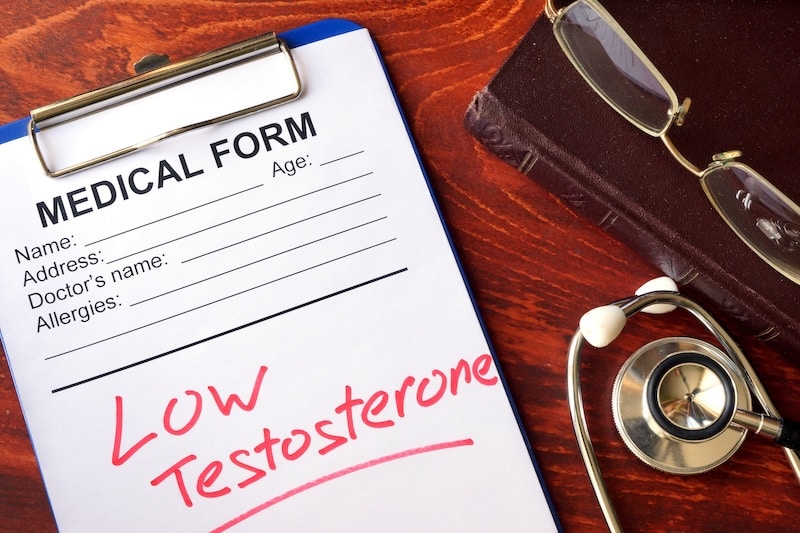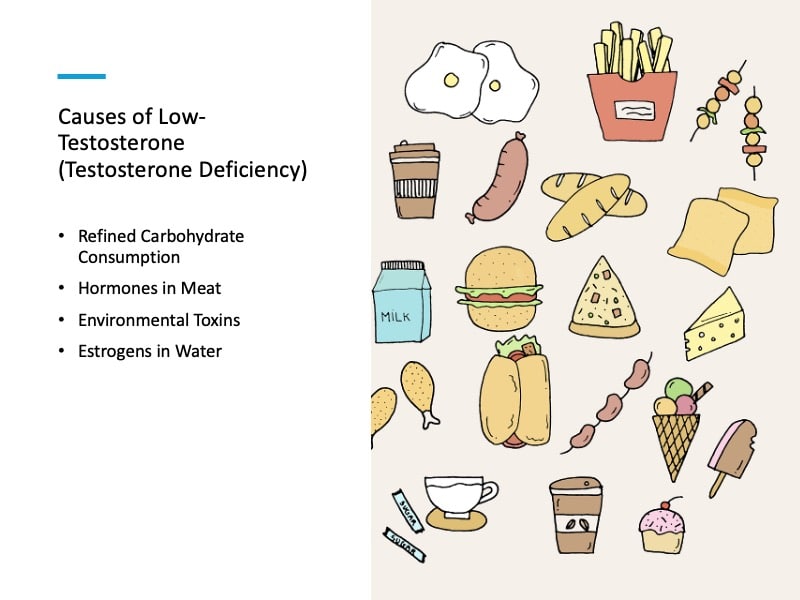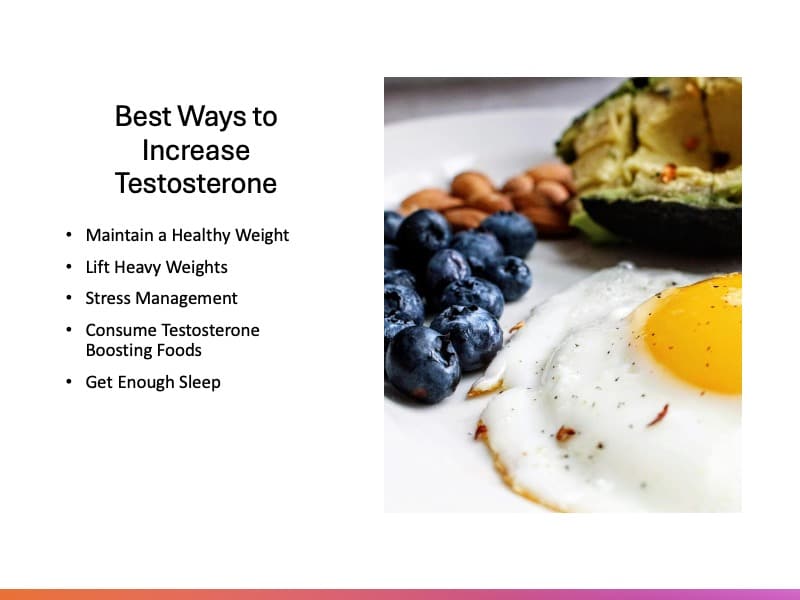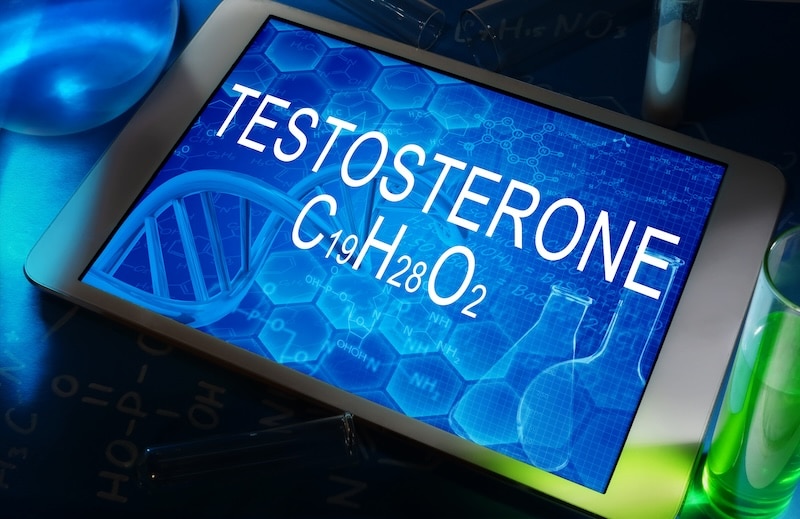Testosterone: What is it and How Does it Affect Your Health?
Although often associated with masculinity and muscle-building, testosterone is far more than a “man’s hormone.”
Testosterone plays a vital role in both male and female health, influencing everything from energy and strength to mood, libido, and metabolic function.
However, many people, particularly men over the age of 45, struggle with low testosterone.
The Cleveland Clinic reports nearly 40% of men in this demographic have testosterone levels below the clinical range.
With increasing rates of inactivity, poor diet, and environmental exposure to endocrine-disrupting chemicals, low testosterone is becoming a widespread public health concern.
Before you read the rest of my article, as an additional resource, I’ve found the book Good Energy by Dr. Casey Means to be an incredibly useful guide for anyone looking to take control of their health.
It’s especially powerful as a resource for naturally increasing energy, improving metabolic function, and building sustainable habits that truly make a difference.
Last update on 2025-04-15 / This article includes affiliate links/Images via Amazon Product Advertising API. I may earn commissions on purchases made through these links.
What Is Testosterone?
Testosterone is a powerful anabolic steroid hormone that plays a fundamental role in human development, health, and performance.
It belongs to a class of hormones called androgens, which are responsible for the development of male characteristics, but are also essential for women’s hormonal health and overall well-being.
- In men, testosterone is produced predominantly in the Leydig cells of the testes, with smaller amounts synthesized by the adrenal glands.
- For women, testosterone is produced in lower quantities by the ovaries and adrenal cortex.
While testosterone is often labeled the “male sex hormone,” it is vital in both sexes and across all life stages—from puberty and reproductive development to muscle growth, fat metabolism, and mood regulation.
Testosterone is also a precursor to other critical hormones, such as estradiol (a form of estrogen), especially in women.
This means it serves as a building block for various hormonal pathways in the body.
Its production is governed by a feedback loop known as the hypothalamic-pituitary-gonadal (HPG) axis.
The brain (hypothalamus and pituitary gland) signals the gonads to produce testosterone, and in turn, testosterone levels help regulate this cycle.
Even small fluctuations in testosterone can have wide-ranging effects on physical health, cognitive function, reproductive ability, and emotional balance, making it one of the most influential hormones in the human body.
What Does Testosterone Do?
Testosterone is essential for reproductive function, but its effects extend well beyond fertility and sexual health.
This potent hormone plays a key role in metabolism, cognitive function, body composition, and emotional well-being across the lifespan for both men and women.
Testosterone FunctionsIn Men
Testosterone is the primary sex hormone in men, responsible for:
- Development of Male Sex Organs: Initiates the formation of the penis and testes during fetal development and plays a critical role in puberty.
- Secondary Sex Characteristics: Stimulates the growth of facial and body hair, deepens the voice, and promotes the thickening of skin and increased oil production.
- Muscle Growth and Bone Density: Enhances protein synthesis and calcium retention, supporting lean muscle mass and strong bones.
- Sperm Production and Fertility: Regulates the function of Sertoli cells in the testes, which are essential for healthy sperm development and overall male fertility.
Low testosterone in men can reduce sex drive, impair erectile function, weaken bones, and limit muscle-building potential—even in active or younger individuals.
Testosterone Functions In Women
While testosterone is present in smaller amounts in women, it remains crucial for female health:
- Red Blood Cell Production: Works synergistically with other hormones like erythropoietin to stimulate bone marrow and maintain healthy oxygen-carrying capacity.
- Lean Muscle and Bone Health: Helps preserve strength and bone density, especially during and after menopause when estrogen and testosterone levels drop.
- Mood Regulation and Libido: Positively influences mood, motivation, and sexual desire, particularly during reproductive years.
- Hormonal Harmony: Acts as a precursor to estrogens and contributes to the delicate hormonal balance necessary for regular menstrual cycles and reproductive wellness.
When testosterone levels are too low in women, symptoms can include fatigue, reduced sexual desire, muscle weakness, mood swings, and even depression.
Testosterone Functions in Both Sexes
Testosterone impacts a wide array of physiological and psychological processes, including:
- Fat Distribution: Encourages lean body mass and helps reduce visceral fat storage, particularly in the abdominal region.
- Red Blood Cell Production: Aids in the maintenance of hematocrit and hemoglobin levels, supporting cardiovascular endurance and tissue oxygenation.
- Strength and Physical Performance: Fuels power output, speed, and resilience—essential for athletic performance and daily function.
- Energy and Mental Clarity: Supports mitochondrial function, improving energy metabolism and cognitive sharpness.
- Emotional Stability: Low levels are associated with increased risk of depression, irritability, and anxiety.
- Bone Mineral Density: Protects against osteoporosis by maintaining bone structure and promoting calcium retention.
This comprehensive hormonal influence explains why testosterone deficiencies can lead to broad-spectrum symptoms, affecting everything from body composition and mood to immune function and cardiovascular health.
How to Test Testosterone Levels?
Testosterone is measured through a simple blood test, ideally taken early in the morning when levels are highest.
Most clinics measure total testosterone, but depending on symptoms, free testosterone or bioavailable testosterone may also be tested for a more accurate picture.
At-home testing kits, now widely available online, offer convenient and private options for measuring hormone levels. These kits include detailed instructions and are analyzed by certified labs.
What Are Normal Testosterone Levels by Age?
Testosterone levels vary significantly based on age and individual health status. Here’s a general reference:
Men (ng/dL):
- 20–29 years: 270–1,080
- 30–39 years: 219–1,008
- 40–49 years: 201–993
- 50–59 years: 170–918
- 60+: 156–700
Levels begin to decline naturally after the age of 30, around 0.4% to 2% per year, but lifestyle factors can accelerate this loss (McBride et al., 2016).
Women (ng/dL):
- Normal range is generally 15–70, with peak levels in early adulthood and gradual decline over time.
What Happens When Testosterone Levels Are Too Low or Too High?
Balanced testosterone levels are essential for maintaining physical vitality, emotional stability, and metabolic health.
When testosterone levels fall outside of the optimal range, whether too low or excessively high, can create a cascade of physiological disruptions that affect nearly every body system.
Low Testosterone (Hypogonadism)

Low testosterone, clinically known as hypogonadism, occurs when the body fails to produce sufficient levels of testosterone for age and biological needs.
This condition can result from primary testicular failure, pituitary dysfunction, chronic illness, or lifestyle-related factors such as obesity and poor diet.
Common symptoms include:
- Low Libido and Erectile Dysfunction: Testosterone directly affects sexual desire and the ability to achieve or maintain erections. Low levels impair nitric oxide function and reduce sensitivity to sexual stimulation.
- Decreased Muscle Mass and Strength: Muscle protein synthesis is testosterone-dependent. Deficiency can lead to muscle wasting, reduced strength, and slower recovery from exercise.
- Fatigue and Poor Concentration: Cognitive fog, low motivation, and persistent fatigue are hallmarks of low T, partly due to its role in supporting mitochondrial energy production and neurotransmitter function.
- Increased Body Fat—Especially Visceral Fat: Low testosterone is strongly correlated with abdominal obesity, which further suppresses testosterone by increasing aromatase activity (the enzyme that converts testosterone into estrogen).
- Depression, Anxiety, and Irritability: Emotional instability is common, with low testosterone linked to increased rates of depression and lower resilience to stress.
- Osteopenia and Osteoporosis: Testosterone is essential for maintaining bone density. Chronically low levels can increase the risk of fractures and lead to premature skeletal aging.
In men, hypogonadism can also contribute to infertility due to impaired spermatogenesis, while in women, it may present as reduced sex drive, low energy, mood fluctuations, or diminished physical performance.
High Testosterone
Excessively high testosterone levels—though rare without the use of anabolic steroids or Testosterone Replacement Therapy (TRT) misuse, can also be problematic.
This condition may result from endocrine tumors, supplementation abuse, or genetic factors like polycystic ovary syndrome (PCOS) in women.
Potential symptoms and complications include:
- Aggression and Mood Swings: Elevated testosterone can overstimulate the amygdala and impact serotonin levels, leading to irritability, volatility, or even manic behavior.
- Oily Skin and Severe Acne: Overactive sebaceous glands are common in high testosterone states, often resulting in persistent acne or skin inflammation, particularly in younger males or women with PCOS.
- Sleep Disturbances and Insomnia: Imbalanced hormone levels can disrupt the circadian rhythm and lower melatonin production, interfering with sleep quality.
- Increased Risk of Cardiovascular and Liver Issues: High testosterone—especially through synthetic or exogenous use—has been associated with elevated blood pressure, erythrocytosis (excess red blood cells), and liver enzyme elevations, all of which can increase long-term health risks.
- Prostate Enlargement: In men, excessive testosterone may accelerate benign prostatic hyperplasia (BPH) or stimulate prostate cancer growth in predisposed individuals.
In women, high testosterone levels can lead to hirsutism (unwanted hair growth), irregular menstrual cycles, and infertility, often presenting as part of hormonal disorders like PCOS.
Causes of Low Testosterone

In today’s world, multiple dietary and environmental factors quietly erode testosterone levels in both men and women.
While many people are aware of the obvious lifestyle contributors to low testosterone, such as poor sleep and inactivity, fewer recognize how common food and environmental exposures can disrupt hormone balance at a much deeper level.
Refined Carbohydrates and Insulin Resistance
The typical Western diet is heavily based on refined carbohydrates.
Think breakfast cereals, white bread, pasta, pastries, and sugar-sweetened beverages.
These foods spike blood sugar rapidly and promote chronically elevated insulin levels, which is the gateway to insulin resistance, metabolic syndrome, and, eventually, type 2 diabetes.
Elevated insulin disrupts the body’s hypothalamic-pituitary-gonadal (HPG) axis, a critical hormonal feedback loop responsible for testosterone production (Hut et al., 2018).
Over time, this hormonal disruption can significantly reduce natural testosterone synthesis.
Frequent insulin spikes not only damage metabolic health but also promote abdominal fat accumulation, which increases estrogen production and further suppresses testosterone, a compounding cycle that’s difficult to break without major dietary changes.
Hormones in Conventionally Raised Meat
In the United States, exogenous hormones such as estrogen and testosterone analogs are commonly administered to livestock to accelerate growth and increase yield.
These synthetic hormones can persist in meat products and, when consumed in significant amounts over time, may interfere with endogenous testosterone production in the human body (Kolok et al., 2018).
That doesn’t mean meat is inherently bad for testosterone levels.
In fact, quality meat is a rich source of zinc, vitamin B12, iron, amino acids, and healthy fats, all of which support hormone synthesis.
The key is to choose grass-fed, pasture-raised, organic, hormone-free meat whenever possible to reduce your exposure to synthetic hormones and maintain hormonal balance.
Environmental Toxins
A wide range of environmental toxins, often classified as endocrine-disrupting chemicals (EDCs), can suppress testosterone production across all age groups.
Common culprits include:
- Phthalates: Found in plastics, personal care products, and household items
- Bisphenol A (BPA): Common in canned foods, plastic containers, and thermal receipts
- Pesticides and industrial pollutants
These substances mimic or block natural hormone signals, disrupting the endocrine system’s normal function.
Long-term exposure to these toxins has been linked to decreased testosterone levels, poor fertility, and other reproductive issues (Krzastek et al., 2020).
To reduce your exposure:
- Opt for BPA-free containers and glass storage
- Use organic personal care products
- Choose organic produce and hormone-free animal products
While it’s impossible to eliminate all environmental toxins, minimizing contact with these disruptors can meaningfully support hormone health.
Estrogen Contamination in Water Supplies
Another lesser-known threat to testosterone health is the presence of estrogen compounds in public water systems.
These synthetic and natural estrogens can enter water supplies through agricultural runoff, pharmaceutical disposal, and even human waste.
Once ingested, they may interfere with the body’s hormonal signaling, particularly by elevating estrogen-to-testosterone ratios (Gonsioroski et al., 2020).
This estrogen contamination doesn’t typically cause immediate symptoms, but chronic, low-level exposure can compound other factors and contribute to suppressed testosterone over time.
Filtering your tap water with a high-quality filtration system, especially one that removes pharmaceutical residues and endocrine disruptors, can offer another layer of protection.
Bad Sleep Habits
Sleep is when your body does most of its hormonal repair and regeneration, especially during the early hours of deep sleep when testosterone production naturally peaks.
Poor sleep habits are one of the most common and overlooked causes of low testosterone in both men and women.
Research shows that even one week of restricted sleep, such as getting fewer than 5 hours per night, can reduce testosterone levels by up to 10–15% (Leproult & Van Cauter et al., 2015).
This suppression is largely due to disrupted circadian rhythms, which coordinate the release of luteinizing hormone (LH) and other hormones that drive testosterone synthesis.
Without consistent, high-quality sleep, your body never reaches the deep REM cycles necessary for optimal testosterone release.
Over time, this contributes to low energy, poor libido, muscle loss, fat gain, and mood instability.
Common Bad Sleep Habits That Disrupt Testosterone
- Late-night screen time (TV, smartphones, computers)
- Irregular sleep schedules or shift work
- Overuse of caffeine or stimulants late in the day
- Frequent nighttime wake-ups due to alcohol, stress, or poor sleep environment
- Not winding down properly before bed
Establishing consistent bedtime routines, cutting screen exposure, and creating a cool, dark sleeping environment can help restore natural testosterone rhythms.
Excess Stress
Stress isn’t just emotionally draining, it directly interferes with your body’s ability to maintain healthy testosterone levels.
Understanding the difference between acute vs chronic stress is key, as short-term (acute) stress can trigger temporary hormonal shifts, but prolonged (chronic) stress consistently elevates cortisol and causes sustained suppression of testosterone production.
Chronic psychological or physiological stress raises cortisol, the body’s primary stress hormone, which competes with testosterone in multiple biological pathways.
High cortisol levels:
- Suppress testosterone synthesis in the Leydig cells
- Disrupt the HPG axis, decreasing luteinizing hormone (LH) output
- Increase insulin resistance and fat gain, which further reduces testosterone
- Impair sleep and recovery, compounding the hormonal damage
This hormonal imbalance doesn’t just lower testosterone, it creates a negative feedback loop of fatigue, anxiety, poor performance, and further stress.
Modern Stressors That Sabotage Testosterone
- Work pressure and lack of downtime
- Financial or relationship stress
- Overtraining or lack of recovery in athletes
- Poor diet and blood sugar imbalances
- Mental burnout from screen overload and social media
Too Much Blue Light and Hormonal Disruption
In today’s digital age, exposure to blue light from screens is practically unavoidable—but chronic overexposure, especially after sunset, can severely impact testosterone regulation by interfering with the body’s melatonin and sleep cycles.
Blue light exposure in the evening:
- Suppresses melatonin production, the hormone that induces sleep
- Delays circadian rhythm and the onset of deep, testosterone-producing sleep phases
- Increases nighttime cortisol, which disrupts testosterone output
- Reduces overall sleep quality and duration, blunting next-day hormone levels
Because testosterone production relies heavily on deep, uninterrupted sleep, excessive screen time, especially before bed, can directly contribute to hormonal imbalances.
Ways to Minimize Blue Light Exposure and Protect Testosterone
- Use blue light filters or “night mode” on all devices after sunset
- Wear blue light-blocking glasses in the evening
- Avoid screens 1–2 hours before bed
- Replace nighttime screen time with relaxing activities like reading, stretching, or meditation
- Use warm, low-light lamps instead of overhead LED lights at night
Minimizing blue light exposure is one of the simplest yet most effective lifestyle changes you can make to preserve natural sleep rhythms and support healthy testosterone production.
Excessive Alcohol Consumption
Alcohol, particularly when consumed frequently or in large quantities, is a significant disruptor of hormonal balance, with direct and indirect effects on testosterone production in both men and women.
Excessive drinking suppresses the hypothalamic-pituitary-gonadal (HPG) axis, reducing luteinizing hormone (LH) signaling and impairing testosterone synthesis.
Even one episode of binge drinking can lower testosterone for up to 24 hours, and chronic use can lead to long-term deficiency.
The liver, responsible for hormone metabolism, also suffers under heavy alcohol consumption.
Impaired liver function leads to increased estrogen levels and higher sex hormone-binding globulin (SHBG), which further lowers free, bioavailable testosterone.
Alcohol also interferes with sleep quality, particularly deep REM cycles when testosterone is naturally produced.
Poor sleep, compounded by elevated cortisol levels due to alcohol-induced stress, further depletes testosterone reserves.
In addition, alcohol promotes weight gain, especially abdominal fat, which increases aromatase activity – the enzyme that converts testosterone to estrogen.
Beer is particularly problematic due to phytoestrogens from hops, which may subtly feminize the hormonal profile when consumed in excess.
To protect testosterone levels:
- Limit alcohol to 1 drink per day (women) or 2 drinks per day (men)
- Avoid binge drinking
- Prioritize alcohol-free days
- Support liver function through diet, hydration, and antioxidants
While moderate intake may be manageable for some, consistent alcohol use is a clear testosterone killer. Cutting back can dramatically improve sleep, energy, libido, and overall hormonal health.
Common Signs & Symptoms of Low Testosterone
Testosterone deficiency doesn’t always present with dramatic symptoms—but over time, even subtle hormonal imbalances can significantly impact physical health, emotional resilience, and daily functionality.
These signs often overlap with other health conditions, which is why testosterone-related issues frequently go unrecognized or misdiagnosed.
Here are the most common indicators of low testosterone in both men and women:
Low Energy and Persistent Fatigue
One of the earliest and most overlooked symptoms of low testosterone is a general sense of exhaustion, even after adequate rest.
Testosterone plays a key role in mitochondrial function, which helps convert nutrients into usable cellular energy (Pronsato et al., 2024).
Low levels impair this process, leading to sluggishness, chronic tiredness, and reduced exercise stamina.
Irritability, Anxiety, or Depressive Symptoms
Testosterone affects neurotransmitter regulation, particularly serotonin and dopamine, chemicals responsible for mood balance and motivation (Celec et al., 2015).
Low levels can trigger symptoms such as irritability, anxiety, mood swings, emotional numbness, or feelings of sadness and depression.
This is sometimes referred to as “andropause” in men, a hormonal parallel to menopause in women (Singh, 2013).
Declining Muscle Strength and Muscle Mass
Because testosterone drives muscle protein synthesis, reduced levels often result in noticeable decreases in lean muscle mass and physical strength.
Even with regular training, those with low testosterone may experience plateaus or regression in performance, slower recovery, and increased risk of injury.
Increased Belly Fat and Decreased Physical Performance
Low testosterone is closely tied to visceral fat accumulation, particularly in the abdominal area (Han et al., 2022).
Increased belly fat not only reflects hormonal imbalance but can worsen it by converting testosterone into estrogen via the enzyme aromatase.
The result is a compounding cycle of weight gain, insulin resistance, and declining metabolic health.
Reduced Sexual Desire or Erectile Problems (in Men)
In men, testosterone is directly responsible for libido and erectile function.
Decreased interest in sex, weaker erections, or erectile dysfunction are among the most recognized signs of low T.
In women, low testosterone may result in reduced sexual desire, vaginal dryness, or difficulty achieving orgasm.
Sleep Problems and Poor Focus
Testosterone helps regulate the sleep-wake cycle, and inadequate levels can contribute to insomnia, restless sleep, or frequent nighttime awakenings (Wittert, 2014).
Poor sleep quality then exacerbates hormonal imbalance by raising cortisol and further suppressing testosterone.
Many also report trouble with concentration, mental clarity, and cognitive performance, commonly described as “brain fog.”
How to Increase Testosterone Naturally

Balancing testosterone doesn’t always require medication. Here are the most effective science-backed strategies for increasing testosterone levels naturally:
Maintain a Healthy Weight
Obesity disrupts hormonal balance, increasing estrogen levels and suppressing testosterone.
Achieving and sustaining a healthy body composition through proper diet and activity helps restore balance.
Lift Heavy Weights
Strength training, especially compound movements like squats and deadlifts, stimulates testosterone production more effectively than cardio workouts.
It also helps maintain muscle and metabolic health.
Eat Testosterone-Boosting Foods
- Oats and Whole Grains: Complex carbs support hormone balance and reduce cortisol.
- Eggs: Rich in healthy dietary fats, protein, and Vitamin D.
- Fatty Fish and Olive Oil: Provide omega-3s and monounsaturated fats needed for hormone synthesis.
- Vitamin D and Zinc-rich Foods: Found in shellfish, pumpkin seeds, beef, and fortified cereals.
Manage Your Stress
Chronic stress increases cortisol, which suppresses testosterone.
Natural stress-management remedies like deep breathing, cold therapy, daily prayer or meditation, and physical activity help regulate cortisol and protect testosterone levels.
Simply reducing mental overload and prioritizing emotional balance can significantly improve your hormonal profile.
Combat stress with daily practices like:
- Deep breathing and prayer
- Meditation and journaling
- Cold exposure (contrast showers)
- Self-massage and stretching routines
Improve Sleep Quality
Testosterone is produced during deep sleep cycles.
Less than 5 hours of sleep per night can significantly reduce testosterone production.
Supplements like melatonin or magnesium, reducing screen time before bed, and keeping a consistent bedtime can all enhance sleep quality.
Qunol Magnesium Glycinate is my favorite magnesium supplement for better sleep.
Last update on 2025-04-15 / This article includes affiliate links/Images via Amazon Product Advertising API. I may earn commissions on purchases made through these links.
Drink More Green Tea
Green tea, particularly rich in L-theanine and catechins like EGCG, helps reduce oxidative stress and lower cortisol, creating a better hormonal environment for testosterone production.
It also supports blood flow, benefiting performance and vitality (Neves et al., 2008).
TRT
For those struggling with persistently low testosterone despite lifestyle improvements, Testosterone Replacement Therapy (TRT) can be a valuable option (Barbonetti et al., 2020).
Online platforms now offer:
- At-home testing
- Virtual doctor consultations
- Tailored treatment plans
TRT should be considered under medical supervision and used alongside natural strategies to optimize overall health.
Final Thoughts: Understanding The Role of Testosterone in Human Health
Testosterone is far more than a sex hormone; it is a cornerstone of overall health, vitality, and resilience for both men and women.
Its influence touches nearly every system in the body, from regulating energy, mood, and muscle mass to supporting sleep, cognition, and reproductive health.
Unfortunately, modern lifestyle factors, such as poor diet, chronic stress, inadequate sleep, and environmental toxin exposure, are driving a steady rise in testosterone deficiency.
Recognizing the signs of low testosterone and understanding the root causes can empower you to take meaningful action before more serious health issues develop.
By focusing on natural lifestyle adjustments, including regular strength training, high-quality sleep, nutrient-dense whole foods, stress management, and reducing exposure to hormone disruptors, you can protect and even optimize your testosterone levels.
For those experiencing persistent symptoms despite developing healthy habits, working with a qualified healthcare provider to explore options like testosterone testing or TRT (Testosterone Replacement Therapy) may offer additional support.
Ultimately, maintaining balanced testosterone is not about chasing peak performance alone, it’s about supporting long-term physical, mental, and metabolic well-being in a world that often pushes hormones out of balance.
If you’re serious about restoring your energy and optimizing your health naturally, I highly recommend checking out Good Energy by Dr. Casey Means. It’s a well-researched, practical resource that complements everything shared here and provides even deeper insights into creating a healthy, high-energy lifestyle.
Last update on 2025-04-15 / This article includes affiliate links/Images via Amazon Product Advertising API. I may earn commissions on purchases made through these links.





